Muslim Traveling Judge
The account of the travels of the Muslim legal scholar Ibn Battuta in the first half of the 14th century reveals the wide scope of the Muslim world at that time.
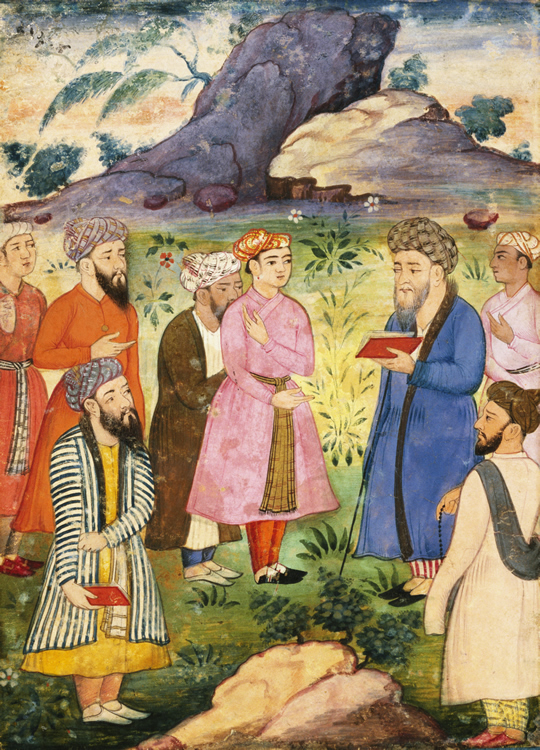 A 1605 painting of a young holy man © Stapleton Collection/CORBIS
A 1605 painting of a young holy man © Stapleton Collection/CORBIS
The Abode of Islam
During the life of Ibn Battuta (sometimes spelled Battutah), Islamic civilization stretched from the Atlantic coast of West Africa across northern Africa, the Middle East, and India to Southeast Asia. This constituted the Dar al-Islam, or “Abode of Islam.” In addition, there were important communities of Muslims in cities and towns beyond the frontiers of Dar al-Islam. People in the whole “umma,” or community of people believing in one god and his sacred law (“shari’a”), shared doctrinal beliefs, religious rituals, moral values, and everyday manners. In the early 1300s this community was expanding dramatically.Background
Ibn Battuta was born in Tangier, part of modern-day Morocco, on February 25, 1304. This port city on the coast of the Atlantic Ocean lies 45 miles west of the Mediterranean Sea, close to the western side of the Strait of Gibraltar — where Africa and Europe nearly collide.The men in Ibn Battuta’s family were legal scholars and he was raised with a focus on education; however, there was no “madrasa,” or college of higher learning, in Tangier. Thus, Ibn Battuta’s urge to travel was spurred by interest in finding the best teachers and the best libraries, which were then in Alexandria, Cairo, and Damascus. He also wanted to make the pilgrimage to Mecca, called the “hajj,” as soon as possible, out of eagerness and devotion to his faith.
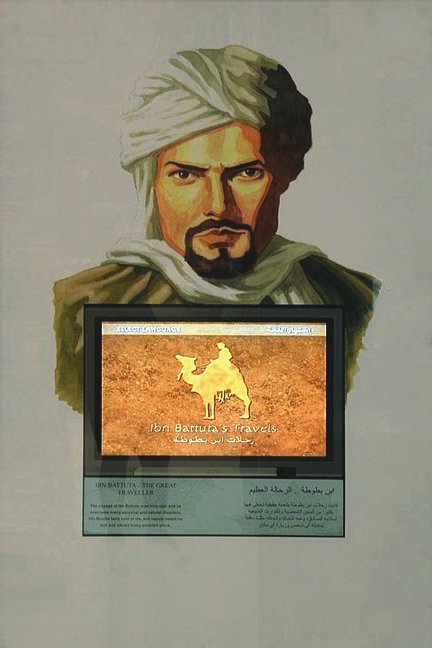 An interactive display at the Ibn Battuta Mall in Dubai, Dubai Construction Update, Imre Solt On
June 14, 1325, at the age of 21, Ibn Battuta rode out of Tangier on a
donkey, the start of his journey to Mecca. Unlike the young Marco Polo, he was quite alone, as illustrated by this passage from The Travels of Ibn Battuta, his detailed account of his wanderings:
An interactive display at the Ibn Battuta Mall in Dubai, Dubai Construction Update, Imre Solt On
June 14, 1325, at the age of 21, Ibn Battuta rode out of Tangier on a
donkey, the start of his journey to Mecca. Unlike the young Marco Polo, he was quite alone, as illustrated by this passage from The Travels of Ibn Battuta, his detailed account of his wanderings:I set out alone, having neither fellow-traveler in whose companionship I might find cheer, nor caravan whose party I might join, but swayed by an overmastering impulse within me and a desire long-cherished in my bosom to visit these illustrious sanctuaries. So I braced my resolution to quit all my dear ones, female and male, and forsook my home as birds forsake their nests. My parents being yet in the bonds of life, it weighed sorely upon me to part from them, and both they and I were afflicted with sorrow at this separation.
— from The Travels of Ibn Battutah
Travels
Ibn Battuta’s solitude did not last long, according to his chronicles. The governor of one city gave him alms of gold and woolen cloth, as almsgiving was considered a pillar of Islam. Ibn Battuta stayed at madrasas and at Sufi hospices as he made his way to Tunis. By the time he left Tunis he was serving as a paid judge, a qadi, of a caravan of pilgrims who needed their disputes settled by a well-educated man. Alexandria and Damascus were two highlights on the part of the trip that followed.Ibn Battuta entered Mecca in mid-October 1326, a year and four months after leaving home. He stayed a month, taking part in all the ritual experiences and talking with diverse people from every Islamic land. While his writings don’t provide much detail about what this experience meant to him, after it was over he set out for Baghdad instead of returning home. He traveled in a camel caravan of returning pilgrims, and this is when his real globetrotting began.
Ibn Battuta led a complete life while traveling. He studied and prayed; he practiced his legal profession; he had astonishing outdoor adventures; he married at least 10 times and left children growing up all over Afro-Eurasia. A few examples of these activities provide a good picture of his life’s journey.
In Alexandria, Ibn Battuta spent three days as a guest of a locally venerated Sufi ascetic by the name of Burhan al-Din the Lame. This holy man saw that Ibn Battuta had a passion for travel. He suggested that Ibn Battuta visit three other fellow Sufis, two in India and one in China. Of the encounter with Buurhan al-Din, Ibn Battuta wrote in his Travels, “I was amazed at his [Burhan al-Din’s] prediction, and the idea of going to these countries having been cast into my mind, my wanderings never ceased until I had met these three that he named and conveyed his greeting to them.”
Ibn Battuta visited another saint who lived a quiet life of devotion in a town near Alexandria. It was summer and Ibn Battuta slept on the roof of the man’s cell. There he had a dream of a large bird that carried him far eastward and left him there. The saint interpreted this to mean that Ibn Battuta would travel to India and stay there for a long time, echoing what Burhan al-Din had said.
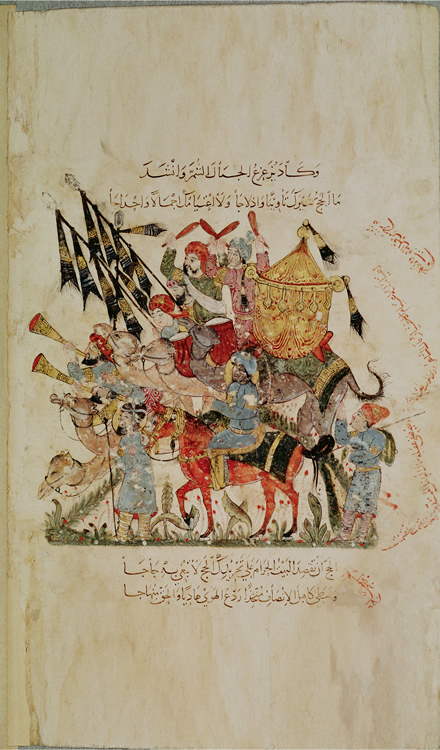 Caravan going to Mecca, from The Maqamat by Al-Hariri © The Gallery Collection/CORBISIn
Damascus, Ibn Battuta boarded in one of the three madrasas. During his
24-day stay he settled down into some formal studies. Damascus had the
largest concentration of famous theologians and jurists in the
Arab-speaking world. They taught by reading and commenting on a
classical book, then testing their students’ knowledge of it and issuing
certificates to those who passed their tests.
Caravan going to Mecca, from The Maqamat by Al-Hariri © The Gallery Collection/CORBISIn
Damascus, Ibn Battuta boarded in one of the three madrasas. During his
24-day stay he settled down into some formal studies. Damascus had the
largest concentration of famous theologians and jurists in the
Arab-speaking world. They taught by reading and commenting on a
classical book, then testing their students’ knowledge of it and issuing
certificates to those who passed their tests.Ibn Battuta then fulfilled the prophesies of the various seers he’d met by traveling to India via Afghanistan, where he had to cross the Hindu Kush Mountains at one of several high passes. His group crossed at the 13,000-foot (4,000-meter) Khawak Pass. “We crossed the mountains,” Ibn Battuta re-called in Travels, “setting out about the end of the night and traveling all day long until sunset. We kept spreading felt clothes in front of the camels for them to tread on, so that they would not sink in the snow.” Upon arriving in Delhi, Ibn Battuta sought an official career from the Muslim king of India, Muhammad Tughluq.
The king of India made a practice of appointing foreigners as ministers and judges. As Ibn Battuta traveled to the court in Delhi, 82 Hindu bandits attacked his group of 22; Ibn Battuta and his men drove them off, killing 13 of the thieves. King Tughluq appointed him judge of Delhi, but since Ibn Battuta did not speak Persian, the language of the court, two scholars were appointed to do the work of hearing cases. After eight years, Ibn Battuta was eager to escape the political intrigue. The king agreed to send him as an ambassador to China, and made him responsible for taking shiploads of goods to the Yuan emperor, in return for the emperor’s previous gifts of 100 slaves and cartloads of cloth and swords.
Ibn Battuta was set to sail from Calcutta with one large ship holding the goods for the Chinese emperor and a smaller ship filled with his personal entourage. Everything and everybody was loaded for departure, but Ibn Battuta spent the last day in the city attending Friday prayers. That evening a storm blew in, and the large ship with the presents ran aground and sank.
The smaller one, with Ibn Battuta’s servants, concubines, friends, and personal belongings, took to sea to escape the storm. Reduced to his prayer rug and the clothes on his back, Ibn Battuta could only hope to catch up with the ship carrying his group.
Thus Ibn Battuta’s travels continued, with narrow escapes and dramatically varying fortunes. Eventually he learned that his ship had been seized by a non-Muslim ruler in Sumatra. He decided to go to China anyway, but stopped on the way at the Maldives, an island group 400 miles southwest off the coast of India.
In the Maldives, Ibn Battuta enjoyed the company of women even more than usual. Usually, he married one at a time and divorced her when he left on further travels. He often had concubines, too, purchased or given as gifts. In the Maldives he married four women on one island, the legal limit under Muslim law. As he wrote in his Travels:
It is easy to marry in these islands because of the smallness of the dowries and the pleasures of society which the women offer... When the ships put in, the crew marry; when they intend to leave they divorce their wives. This is a kind of temporary marriage. The women of these islands never leave their country.From there, Ibn Battuta continued on to China. Battuta’s narrative about China occupies less than 6 percent of his whole story. It is so sketchy and confusing that some scholars doubt that he even went to China and believe he merely fabricated this part of his account. He claims to have gone as far north as Beijing, but his description of that is even vaguer than the rest, so perhaps he only got as far north as Zaitun, now Quanzhou. In any case, he admits in the Travels that in China he was unable to understand or accept much of what he saw; it was not part of his familiar Dar al-Islam:
China was beautiful, but it did not please me. On the contrary, I was greatly troubled thinking about the way paganism dominated this country. Whenever I went out of my lodging, I saw many blameworthy things. That disturbed me so much that I stayed indoors most of the time and only went out when necessary. During my stay in China, whenever I saw any Muslims I always felt as though I were meeting my own family and close kinsmen.
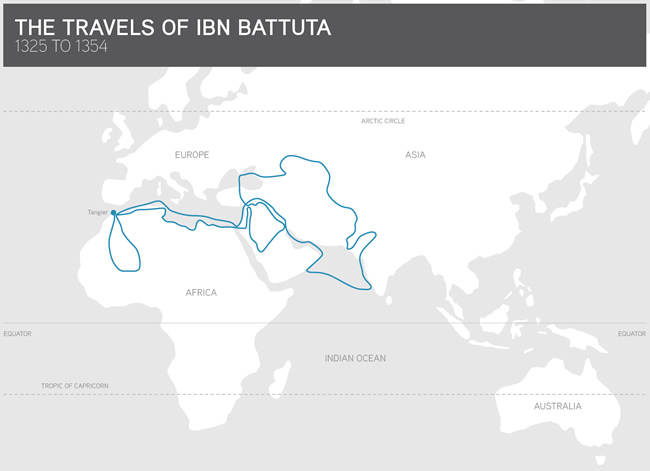 The travels of Ibn Battuta. Click here for a larger version. Download PDF.His writing and his last years
The travels of Ibn Battuta. Click here for a larger version. Download PDF.His writing and his last years
Ibn Battuta returned home in 1349 to Tangier, where he visited the
grave of his mother, who had been carried off by the Black Death
(plague) only a few months before his return. (During his return, he
learned in Damascus that his father had died 15 years earlier.) Ibn
Battuta stayed in Tangier only a few days before leaving to visit North
Africa, Spain, and West Africa (Mali).He returned from that trip in 1354 to Fez, Morocco, where the local sultan commissioned a young literary scholar to record Ibn Battuta’s experiences. The scholar had to compose the whole story into literary form, using a type of Arabic literature called a rihla, indicating a journey in search of divine knowledge. The two men collaborated for two years, with Ibn Battuta telling his story and drafting notes about it. Ibn Battuta possessed an extraordinary memory, but he also misremembered some facts and dates.
All we know about Ibn Battuta’s life after the writing of his book is that he held the office of judge in some town or other. Since he was not yet 50 when he stopped traveling, he is thought to have married again and to have had more children. He died in 1368 or 1369; the place of his death is not known, nor the location of his grave.
The legacy of Ibn Battuta’s Travels
Unlike the impact of the Travels of Marco Polo on the European world, the account of Battuta’s travels had only modest impact on the Muslim world before the 19th century. While copies circulated earlier, it was French and English scholars who eventually brought The Travels of Ibn Battuta the international attention it deserved.How does Ibn Battuta’s account compare with that of Marco Polo’s? Each traveler lived by his wits — they had that in common. Each took joy in dis- covering new experiences, and each exercised amazing perseverance and fortitude to complete extensive travels and return to their home country.
Yet there were many differences. Ibn Battuta was an educated, cosmopolitan, gregarious, upper-class man who traveled within a familiar Muslim culture, meeting like-minded people wherever he went. Polo was a merchant, not formally educated, who traveled to strange, unfamiliar cultures, where he learned new ways of dressing, speaking, and behaving. Ibn Battuta told more about himself, the people he met, and the importance of the positions he held. Marco Polo, on the other had, focused on reporting accurate information about what he had observed. How fortunate we are to have accounts from two contrasting intercontinental travelers from more than 600 years ago.
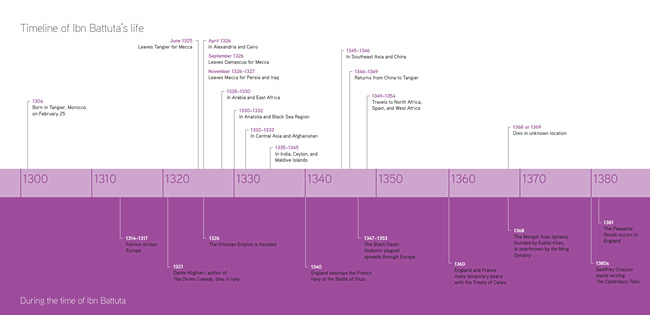 Timeline of Battuta’s life. Click here for a larger version. Download PDF. By Cynthia Stokes Brown
Timeline of Battuta’s life. Click here for a larger version. Download PDF. By Cynthia Stokes BrownFor Further Discussion
How did Islam provide a comfortable environment for Ibn Battuta to travel in? Share your answers in the Questions Area below.Sources
https://www.khanacademy.org/partner-content/big-history-project/expansion-interconnection/exploration-interconnection/a/ibn-battuta
Arno, Joan and Helen Grady. Ibn Battuta: A View of the Fourteenth-Century World. Los Angeles: National Center for History in the Schools, University of California, Los Angeles, 1998.Battuta, Ibn. The Travels of Ibn Battutah, abridged and annotated. Edited by Tim Mackinstosh-Smith. London: Picador, 2002.
Dunn, Ross E. The Adventures of Ibn Battuta: A Muslim Traveler of the 14th Century. Berkeley, CA: University of California Press, 2005.
Waines, David. The Odyssey of Ibn Battuta: Uncommon Tales of a Medieval Adventurer. Chicago: University of Chicago Press, 2010.

No comments:
Post a Comment